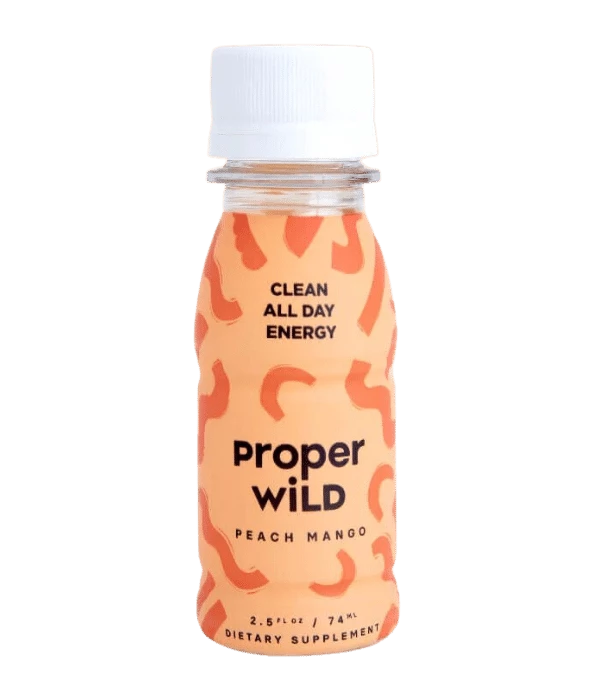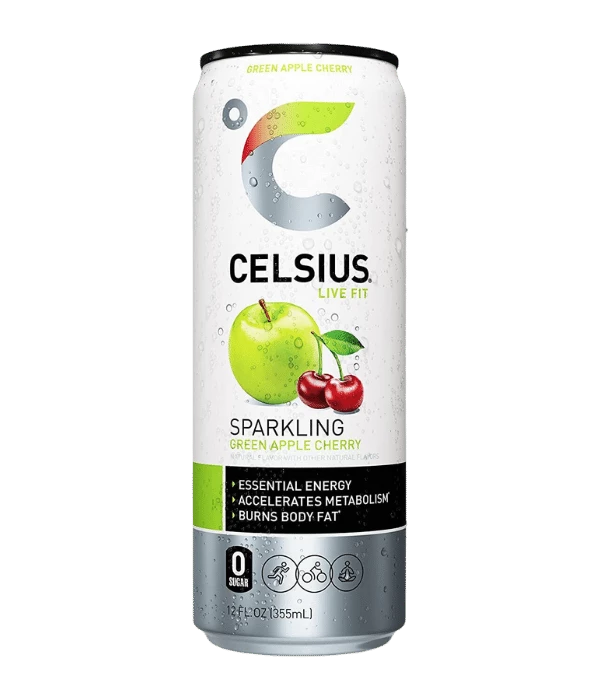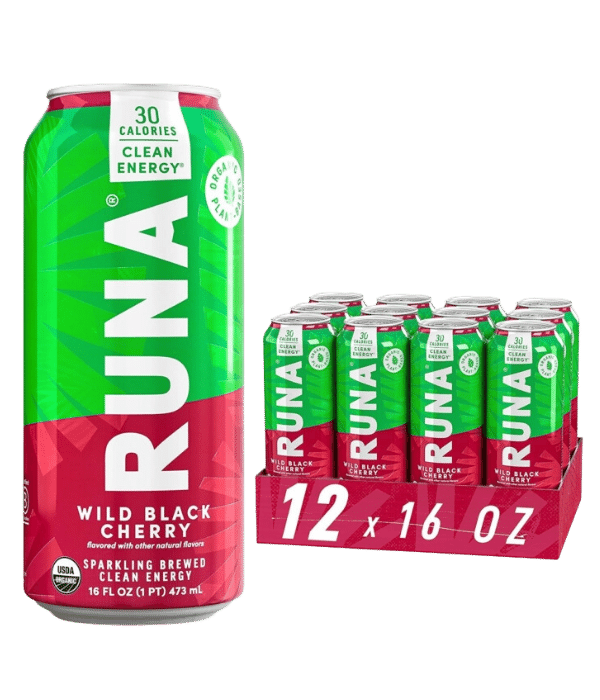Try our favorite, clean protein powder: See our top pick →
Try our favorite, clean protein powder: See our top pick →
This post contains links through which we may earn a small commission should you make a purchase from a brand. This in no way affects our ability to objectively critique the products and brands we review.
Healthy… energy drinks? Bit of an oxymoron, innit?
If we were to restrict ourselves to the early 2000s paradigm of energy drink craziness, then it certainly would be. But we’ve come a long way since the heyday of artificially flavored, preservative-laden sugar and caffeine bombs.
Yes, you can find energy drinks that are good for you today—drinks that provide a balanced, clean boost in energy and/or mental focus without the terrible ingredients or the crash.
Here’s our list of the 6 healthiest energy drinks for doing just that, starting with our favorite: Proper Wild.
Best Overall | Best Value | Organic | |
|---|---|---|---|
| Product | Proper Wild | Celsius | Runa |
| Key Points | Clean ingredients; organic caffeine (100mg) and L-theanine blend for focused energy; sweetened with monk fruit; 8g+ added sugar each | Several botanical extracts provide functional benefits (ginger, green tea, etc.); seven essential vitamins; no aspartame or artificial colors; contains sucralose; strong value | Organic and plant-based; simple ingredient list; 150mg of caffeine per can; sweetened with cane sugar, monk fruit, and stevia; on the pricier side |
| Price | $4 each Shop Now | $1.83 each Shop Now | $5.25 each Shop Now |
Best for: Anyone looking for a balanced energy boost provided by a reliable, clean product.
Earning an overall rating of A in our review, Proper Wild is our go-to recommendation for the standard use case: I want energy without the crappy ingredients.
Speaking of ingredients, Proper Wild’s natural energy drinks contain organic caffeine, L-theanine, organic flavoring, monk fruit juice, sea salt, and that’s about it.
Caffeine-wise, you’re looking at around 100 milligrams per shot, which pairs perfectly with the 120 milligrams of L-theanine to provide a crash-free, focused energy boost.
However, Proper Wild shots do contain upwards of 8 grams of added sugar per bottle, and some of the flavors are pretty bitter.
Overall, this is our favorite among healthy caffeine drinks for its uncompromising balance between effectiveness and ingredient quality.
Best for: Anyone looking for a competitively priced energy drink for regular use that still offers a (mostly) clean ingredient list.
It may not be quite as pristine as Proper Wild when it comes to ingredients—calling you out, sucralose—but Celsius defends their use of the sweetener by claiming they use far less than a gram per can.
Otherwise, Celsius is an excellent option regardless of its price, with green tea extract, guarana seed extract, ginger, biotin, and other ingredients that layer on functional benefits beyond energy.
There are seven essential vitamins in all, and no high fructose corn syrup, aspartame, or artificial colors.
The formulation is geared for thermogenesis, which bodes well for the frequent exerciser and/or those looking to boost metabolism for weight loss.
At less than half the price of some of the items on this list, Celsius is an excellent value for the quality.
Best for: Anyone who doesn’t mind spending extra for an organic, plant-based ingredient drink that still comes with an effective amount of caffeine (150 milligrams).
An impeccably simple, organic ingredient list is the main draw with Runa, which positions itself as the must-have for folks who simply have to have organic everything (we get it).
And when we say simple, we mean that Runa really does have one of the shortest ingredient lists we’ve seen on an energy drink—here’s the Wild Black Cherry ingredient list:
Organic Brewed Guayusa, Carbonated Water, Organic Cane Sugar, Organic Black Cherry Flavor, Monk Fruit Juice Concentrate, Citric Acid, Malic Acid, Organic Stevia Leaf Extract (Reb A and Steviol Glycosides).
Each can provides 150 milligrams of naturally occurring caffeine, which is more than enough for most people to get a natural energy boost. It’s a pity that it doesn’t have L-theanine to smooth out the rush, but if you know how to handle your caffeine, Runa is a very effective option.
Of course, the big asterisk here is that Runa weighs in price-wise at a hefty $5.25 per can, so we recommend buying a small amount and sampling before you consider a more regular commitment.
Best for: People who need to or prefer to avoid caffeine for whatever reason but still want an energy boost; athletes and frequent gym goers looking for a muscle-building boost.
Our first disclaimer is that only two of Nocco BCAA’s flavors are caffeine free: apple and caribbean.
Secondly, we get it—the ever-zealous caffeine mob is not going to be happy with this one. But hey, not everybody can or wants to go the caffeine route. If that’s you, Nocco might be your choice—especially if you like to work out.
Speaking of, Nocco BCAA provides 5000mg of BCAAs, which can prevent exercise-related fatigue. The ingredient list is almost as minimalistic as Runa, listing the following (Nocco Apple Caffeine-Free):
Carbonated Water, L-Leucine, Citric Acid, L-Valine, L-Isoleucine, Natural Flavor, Sucralose, Beta Carotene for Color, Niacin, Vitamin B6, Biotin, Vitamin B12.
You know what we’re going to harp on: the sucralose.
However, Nocco is still sugar free according to the label, meaning they use very little in each can. The vitamin B6 and B12 strengthen the case for an energy boost when paired with the BCAAs, though we won’t pretend it would be as noticeable as a caffeinated drink.
Overall, Nocco Apple Caffeine-Free is a very clean, workout-friendly, and decently affordable option.
Best for: People who are more focused on combating mental fatigue, stress, and burnout than physical exertion.
There are energy drink ads with fitness models sprinting across puddles and lifting weights, and then there’s real life, where most of us work 8+ hours a day at a desk.
Whether you’re up on the power lines or sitting at a desk, your mind will be just as burned out as your body by the end of the week if you don’t take care of it.
This is where FocusAid Brain Boost comes in, providing a robust blend of powerful nootropics like GABA (gamma-aminobutyric acid), panax ginseng, alpha-GPC, and more in addition to 100mg of caffeine.
You also get plenty of vitamin C, vitamin D3, vitamins B6/B12, biotin, and more, making this one of the most nutritious energy drinks around.
There are no sketchy preservatives or artificial sweeteners, thanks to organic agave nectar and stevia, though some are not so fond of the latter for taste and/or digestive health problems that can result.
FocusAid Brain Boost gets our vote as one of the best clean energy drinks out there for addressing health problems related to stress and mental fatigue.
Best for: Anyone looking for a nutritionally well-rounded, subtle energy boost with zero calories.
By now, most discerning customers know to ask “Okay, what’s the catch” when seeing the “zero calorie” label claim.
In the case of Aspire, it’s another appearance of sucralose—though it doesn’t appear to be a high concentration.
Otherwise, this zero-calorie energy drink has plenty to boast about, including several letter vitamins, choline, biotin, calcium, green tea extract, and more.
You might not get quite as much of a buzz with Aspire, as it contains a leaner 80 milligrams of caffeine (about one cup of coffee), but the B vitamins should help to bolster the caffeine somewhat.
It doesn’t get much cleaner in the zero-calorie department, and the supporting ingredients tell of a savvy formulation, so we keep Aspire in our pocket for more aggressive calorie-cutting phases.
The energy drinks in this article, along with other similar products not listed, are generally safe and healthy for people who don’t have a sensitivity to caffeine or any of the other nutrients therein.
As always, it’s important to consult with a physician if you have any questions or concerns relating to your consumption of energy drinks, as safety and efficacy can vary based on each person’s medical/health situation.
Higher-quality energy drinks like those featured in this article may be safe to drink every day depending on what your sugar and/or caffeine intake looks like for the rest of the day.
Most energy drinks warn customers not to exceed two cans a day, so even with high-quality options, always consume in moderation.
Even high-quality energy drinks are not healthier than water when it comes to hydration, and consuming too many energy drinks or replacing water with energy drinks can be very harmful to your health.
Energy drinks may be fortified with more nutrients, but water should always take up the overwhelming majority of your liquid intake.
No longer does the term “energy drink” have to give you boogeyman vibes from the “dawning of Red Bull” era—there absolutely are healthier options out there.
The key differences between the high-quality energy drinks listed in this article and their much less healthy counterparts deal with sugar, caffeine, sweetener, and preservative content.
It’s okay to be picky without compromising, as you can have zero-calorie, caffeine-free, and organic energy drinks made with clean ingredients if you know where to look.
Subscribe now and never miss anything about the topics important to you and your health.